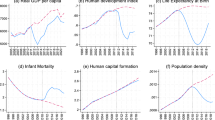Conclusion
Social structure and economic development largely influence the nature of social conflicts and political transformation. A combination of low political and economic integration and a high level of consolidation results in reformist conflicts. Low state intervention in the allocation and accumulation of capital reduces the probability that class conflict will be directed against the state. When state intervention is low, depoliticized, abstract market forces determine capital allocation and accumulation. In addition, low political and economic integration may give the state the appearance of serving societal interests rather than the interests of the upper class. This appearance of autonomy is reinforced by the institutions of formal democracy. As a consequence, class conflict is contained within civil society and deflected from the state. When consolidation is high, reformist conflicts against holders of capital may emerge. The United States experienced such movements in the 1930s. During the Great Depression, the state was drawn into some conflicts, but was not attacked by the working class. Today, the United States, like other advanced industrial societies, is less receptive to consolidation because of moderate levels of economic polarization, greater economic resilience, and high social differentiation. When state intervention and consolidation are low, organized groups with resources may gain economic benefits through segmented class conflict, whereas collectivities with weak solidarity and few resources remain inactive. Such is the case in the United States today.
The combination of a high level of state intervention in capital allocation and accumulation with a high level of consolidation increases the likelihood of revolutionary conflict. High state intervention in capital allocation and accumulation has crucial social consequences. First, it politicizes other-wise abstract market relations. Second, it clearly reveals the state to be allied with a small circle of upper-class entrepreneurs, thereby discrediting the state's claim to serve societal interest. As a consequence, class conflict can readily assume a political character, expanding its target to include the state. A high level of consolidation enhances the capacity of challenging groups to act collectively to resist repression and seize power. Consolidation is more likely in societies with a high level of economic polarization, highly dependent economies, and low social differentiation. Russia in 1917 and Iran and Nicaragua in 1979 are revealing examples. The Russian and Nicaraguan revolutions were carried out primarily by workers and peasants, which helps explain the socialist orientation of the new leadership. In contrast, in Iran, the revolution was largely based on the conflicts and struggles of the traditional middle class, which eventually led to the formation of the theocratic state. A combination of high state intervention and low consolidation generates segmented conflict directed against the state. Many Third World societies are experiencing such a conflict today.
To conclude, Marx's analysis focused primarily on social classes underemphasizing the significance of the state and its relation to society and economy. Skocpol's analysis, on the other hand, primarily focused on the state and the upper class, and failed to specify the proper, determining variables. If the analysis presented here is useful in specifying the conditions and forms of social conflicts, we must pay greater attention to social structural analysis, the nature of the relationship between the state, economy, social classes, and solidarity structures.
Similar content being viewed by others
Author information
Authors and Affiliations
Rights and permissions
About this article
Cite this article
Parsa, M. Economic development and political transformation. Theor Soc 14, 623–675 (1985). https://doi.org/10.1007/BF00160019
Issue Date:
DOI: https://doi.org/10.1007/BF00160019




